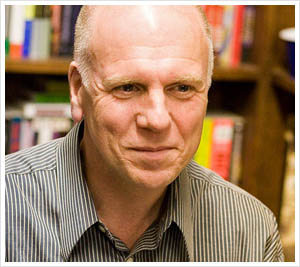Peter Robinson on defending a "bright, funny" man
 The Hague Every other day, Peter Robinson, defence counsel for former Bosnian Serb leader Radovan Karadzic, visits his client at the detention centre near The Hague.
The Hague Every other day, Peter Robinson, defence counsel for former Bosnian Serb leader Radovan Karadzic, visits his client at the detention centre near The Hague.
They meet in the visitors' room to work on Karadzics war crimes trial, which is scheduled to begin in the International Criminal Tribunal for the former Yugoslavia (ICTY) on Monday.
It is a great experience to work with Mr Karadzic," Robinson says in an interview with the German Press Agency dpa in the days leading to the trial. He is bright, funny and works extremely hard."
Asked how Karadzic feels about the proceedings, Robinson says "disappointed."
"He looks forward to having his day in court but feels is he not adequately prepared."
Karadzic has been able to study "only a fraction" of the 1.2 million pages that comprise the case against him, says Robinson. "He feels he is inundated with material."
Robinson is a criminal defence attorney who over the years has become increasingly involved in international criminal trials, which even became the inspiration of his legal thriller The Tribunal, published in 2004.
The US-born lawyer is also defence counsel of Joseph Nzirorera, former president of the Rwanda National Assembly, who is being tried at the International Criminal Tribunal for Rwanda in Arusha, Tanzania.
Previously, Robinson assisted in the defence of Dragoljub Ojdanic, the former chief of staff of the Yugoslavian Army, whom the ICTY sentenced to 15 years imprisonment in February.
Robinson emphasizes that although Karadzic is very capable of representing himself in court," a 27-member team is working behind the scenes on his defence.
There are legal associates - including myself, three case managers, two investigators, 13 interns and six scholars," says Robinson.
These include international criminal law experts Kevin Heller, Goran Sluiter, Alexander Zahar, Andreas OShea, Kate Gibson and Gideon Boas. Most of them have also been involved, or still are, in the legal proceedings of other international tribunals. Until 2006, Boas served as senior legal advisor to the ICTY chamber.
Robinson maintains the "ICTY is paying the cost" of the defence and speaks about "eight paid team members who receive between 15 and 25 euros (22 and 37 dollars) per hour."
The ICTY maintains that since Karadzic is representing himself and therefore waived his rights to legal aid from the tribunal, all expenses are his alone, leaving only administrative expenses, such as translation costs" for the ICTY.
Robinson describes his client as a man of the world" who knows a lot about many different things, including religion, medicine, international politics and literature.
"Dr Karadzic is a very friendly and personable man. He has a lot of humour, he is smart and has interesting things to say."
Over time, their meetings have become very informal", Robinson says. He met Karadzics daughter and her husband the Netherlands, but says he has not yet been introduced to Karadzic's wife.
Though I imagine the family will be present at some point during the trial. I do not know whether they will already be there at the opening."
The ICTY delivers all new materials about Karadzics case to him on CD-rom, but the former Bosnian Serb leader depends on Robinson and his team to provide him with legal background literature.
Robinson, who says his client is very bright and has picked up legal concepts very quickly," is confident Karadzic will do well in court. He knows the facts that happened in Bosnia better than anyone else."
Why then did Karadzic recently request permission for Robinson to speak on his behalf during the trial? Was it Robinson or the former psychiatrist himself who doubted his ability to represent himself properly?
Neither," Robinson says. We both came up with this idea after having cooperated for many months. Our Dr Karadzic trusts me. He felt he knew in what kind of situations he could rely on me."
Several previous ICTY defendants focused their defence strategy on challenging the primary legal principle the prosecution used to establish that someone was responsible for the atrocities committed by others. If only they could prove the accused was a member of a so- called joint criminal enterprise", then he could be liable.
The concept of a `joint criminal enterprise makes it very difficult for someone to defend himself," Robinson says, adding that Karadzic would however not challenge this legal principle during his defence.
The ICTY has rejected all previous challenges to that legal principle. In fact, the court has expanded liability under that concept.
"I will not disclose the direction Mr Karadzic's defence strategy. It will become clear when he delivers his opening statement," says Robinson. (dpa)